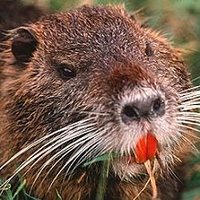
Evidently know as "coypus" in all other parts of the world, if you live in LA, you would refer to this animal as a Nutria. I have tried to explain to friends out of state what a nutria is on multiple occasions. I'll give you a few bullets pulled from multiple sources:
- Weigh on an average of 12 lbs; occasional individuals may weigh 25 pounds or more
- Mammary glands are located on the side of the body
- The hind legs are large compared to the forelegs; consequently, when moving on land, the nutria's chest drags on the ground and its back appears hunched
- The tail itself is 12 to 17 inches long
- The new band that formed after the Possibilities broke up in 2004
Two small related anecdotes:
- Carlee and I occasionally walk in the local park, which has a really great walking path and a small pond. Nutria have set up a home there and you can often see them around the pond. They come right up to you, mingle with the ducks, and eat the bread that you throw them. Good times. We saw 8 tonight.
- I'm standing in line for gumbo at a wedding last week and the woman behind me is telling another man how she prefers to cook her nutria in a crock pot. Remember now, this is a rodent. Enough said.
- Here is a recipe. It is "heart healthy."
4 comments:
I can't believe you left out the orange teeth! They have orange teeth! (check out the picture-- that's real)
I loves me some nutria?
Can't say I've ever tried it, or had the opportunity for that matter.
I'm never one to pass up pulling information from wikipedia, which I'm clearly enamored and in a honeymoon phase with.
Wikipedia has this to say about the name:
There are two common names used in the English language for Myocastor coypus. Coypus originated from the Amerindian Araucanian language word coypu or kóypu and adopted by American Spanish as Coipo is generally used in Europe and Latin America. This avoids confusion with, the term "nutria," which is Spanish for carnivores commonly called "otters" (Lutra sp.) in British and American English. In North America and Asia, the term "nutria" is the more commonly used one for Myocastor coypus.
YW: I did leave out the teeth...my bad. They are someting to behold though.
CHL: Thanks for the additional info.
Sineddie: Squirrels are a little gamey for my taste. Try pigeon.
Post a Comment